#psychogenic seizures
Note
u have a v distinct way of doing things and i am v aware of it so i play by ur methods. i will take this excessively diplomatically so no one can possibly misconstrue my words
i made the original post ab this whole thing. in spite of having been labeled as anti endo (and a singlet for some reason) i’m not rly. i have been involved in the plural community long before my DID dx and my last bf was a veritbonder. i have seen the endo community from the inside and don’t have issues w it.
my problem is the disingenuous nature of many syscoursers, and you are not excluded from this. i could do the same thing as you have done and explain why i think PNES should just be called regular seizures and they’re exactly the same now. there are many sources where they have been called seizures for years and years. but language changes, and i know you know this. it is one of your whole arguments as to why you are for the use of tulpa. to you, that word means something different than its origins.
to me, as a bodily semiverbal person, these terms mean something different. these words have evolved within the community that they were applied to. the system community, both endogenic and traumagenic, is dissociated (ha) from the semi/nonverbal community at large. you don’t know how we use these words because you literally do not participate in our community or culture. just like someone who commented on one of your other posts said, this is exactly like when verbal autistics who lose speech insist that saying “go nonverbal” doesn’t hurt nonverbal people.
as i said in my original post, and yet people somehow become unable to read for one sentence, if one headmate fronts for a significant amount of time that you could be considered semiverbal as one body, then you can do that. you are very disingenuous with your “bodily experiences” post, even though i am very sure you understand what people mean by that. my entire body regardless of any headmate fronting will always be semiverbal or nonverbal as my brain damage progresses. i use these words to tell people that as a body i cannot speak how you speak. if i had some headmates that couldn’t talk i would just say that. those specific ones can’t talk. my body is verbal overall.
if you go into our communities, we will hear you say “i am nonverbal” and will assume that your body does not and cannot speak. we will defer to you and seek to uplift your voice as one of the most disabled members of our society. our community is based around intersectionality and understanding that there are people more disabled than you. it is the job of verbal people to listen to me, and it is my job to listen to nonverbal people.
if you use these terms just for yourself. just between you and your therapist. between you and your friends. then no, it doesn’t matter. it was never about that. it is about the community and community implications of people who are objectively less disabled taking a word for people who are more so.
headmates can be people, they can do that, but a single body exists. you can’t just ignore that. i don’t become white when my white headmate fronts. i don’t gain the ability to walk unaided when abled headmates front. i don’t become less disabled in any way. i don’t become verbal.
and if you want to counter with abled systems can have alters that can’t walk, because i know you just want to, we don’t call it paralysis. we call it functional, somatic, or psychogenic paralysis. it works differently in the body just the same. you can’t insert yourself into semi/nonverbal spaces any more than you can insert yourself into a SCI support group.
i could do the same thing as you have done and explain why i think PNES should just be called regular seizures and they’re exactly the same now. there are many sources where they have been called seizures for years and years. but language changes, and i know you know this.
I'm already lost...
Is there some sort of discourse claiming that you can't call psychogenic non-epileptic seizures... seizures?
and if you want to counter with abled systems can have alters that can’t walk, because i know you just want to, we don’t call it paralysis. we call it functional, somatic, or psychogenic paralysis.
Or that psychogenic paralysis isn't a valid type of paralysis?
The cause may be different, but there are a ton of different causes for various conditions.
Someone blinded by an eye disease is blind. Someone blinded by their eyes being physically damaged is blind. Someone who experiences psychogenic blindness is blind.
Likewise, psychogenic paralysis IS paralysis. And a psychogenic non-epileptic seizure IS a seizure. You can add a qualifier to that... but it's not necessary.
if you go into our communities, we will hear you say “i am nonverbal” and will assume that your body does not and cannot speak.
That could be a fair assumption with no context. Although I... frankly doubt this happens often, or is a mistake that lasts long without being corrected.
If someone hears me say "I'm a cis woman" without context, I'm sure they would wrongfully assume I mean that the body is AFAB.
Obviously, it's important to try to mitigate miscommunications like these. But I assume that if you're dealing with a system with nonverbal headmates, you'll realize shortly the error. Unless that nonverbal headmate is the host or is otherwise fronting all or most of the time, in which case... maybe the miscommunication isn't as important as you think it is. 🤷♀️
our community is based around intersectionality and understanding that there are people more disabled than you. it is the job of verbal people to listen to me, and it is my job to listen to nonverbal people.
And this, I think is a mistake. At least when taken to the extremes I see here.
First... I'm really not comfortable with the idea of "more disabled" here. Sure, you can kind of apply this in specific contexts to try to say recurrent symptoms aren't as bad because they don't happen as often... but having your legs randomly give out while crossing the street might be more harmful than being a fulltime wheelchair user who wouldn't have been in that situation.
I'm also not comfortable with this thought in this specific case as it suggests that the nonverbal singlet is "more disabled" than the traumagenic DID system with severe memory loss and c-PTSD who has nonverbal headmates, and therefore gets a right to police their terms.
But let's say for the sake of argument this has merit and DID systems with nonverbal headmates are "less disabled" than nonverbal singlets:
Yes, you should absolutely listen to people with disabilities. Especially severe ones. But...
Dysphoric transgender people are technically more disabled (in that specific context) than non-dysphoric ones.
The same logic you're using could just as easily be used to support transmedicalists over non-dysphoric transgender people. Actually, the same logic HAS been used this way. Repeatedly. It's one of the main talking points employed by transmeds to garner sympathy.
There HAS to be more critical thought put into these issues than just "listen to the most disabled people in the room," which in this context really feels more like "accept what the most vocal members of a group say on a given platform without question."
This is also the logic sysmeds use against endogenic and non-disordered systems.
"We're disabled trauma survivors, so therefore you're supposed to listen to us when we claim this other marginalized group of people aren't real and their experiences aren't valid, and they aren't allowed to use terms we claim are ours regardless of whether those terms originally were or not. If you disagree with us then you're ableist."
We cannot afford to normalize this sort of exclusionism and gatekeeping.
#syscourse#neurodivergent#neurodiversity#actually neurodivergent#multiplicity#systems#system#plurality#plural#endogenic system#disability#mental health#nonverbal#sysblr#actually neurodiverse#asd#autism#pnes#psychogenic seizures#actually a system
54 notes
·
View notes
Text
Would anyone be interested in me making an info post about non-epileptic psychogenic seizures? They are a pretty common comorbidity in people with DID or OSDD and other dissociative disorders but the communities don’t talk about them a lot.
#did osdd#did system#dissociative identity disorder#actually did#polyfrag system#polyfragmented#endos dni#mental health#osdd 1a#osdd 1b#dissociative amnesia#dissociative alters#complex dissociative disorder#cptsd#complex post traumatic stress disorder#psychogenic seizures#non epileptic seizures#pnes
35 notes
·
View notes
Text
i have seizures almost every day
usually at night, when i am getting ready for bed
sometimes they happen at other times though
today at around 4 i felt very odd so i laid down. and i had a seizure
and then i was so tired afterwards i napped
it is very exhausting, having a seizure. its not like you just have one and then are fine afterwards. it takes some recovery time also. sometimes recovery isnt so long, maybe 5-10 mins. but its still necessary. and usually, if the seizure is more exhausting, i need more time to recover. its very much correlated to how the seizure is and makes me feel.
sometimes seizures are painful. they make me move or stay in painful positions. its not so much the seizure that hurts as it is how my body hurts from moving like that. especially if i happen to be on a hard surface and/or hit anything.
thats why i tend to lay down if i feel a seizure coming on. most people have an aura or some kind of warning for seizures. for me it can be visual (like a migraine aura) or smells (hallucinated smells), but usually it is overwhelming fatigue paired with stressful situations prior to the fatigue onset.
i rarely talk about my experiences with seizures. i feel it is good for me to do so. especially if it might help someone else understand me, or understand themselves and feel less alone.
seizures can be a lonely experience. people look at you funny when you say you have seizures. like somewhere between doubt and pity. i don't like it.
and if it is not that look, it is something like fear. fear they might have to be responsible for me during a seizure, like i am some burden they don't want and aren't prepared for. as if i haven't lived this long with seizures taking care of them on my own... or like it is infectious and they might catch seizures, too. i dislike this look more so than the pitying one.
but i do like myself. so maybe talking about seizures will make people be less incredulous and pitying, and more understanding and kind. who knows! i can always hope for better future. and i can always move towards that with my actions.
16 notes
·
View notes
Text
PNES & Seizure Flag coining
we noticed that there was no PNES flag (which we expected), and no seizure flag (which surprised us) so we made both.


the flag on the left is the seizure flag.
purple is often associated with epilepsy, but we added a black stripe at the bottom and a white stripe at the top to symbolise non-epileptic seizures.
The ribbon in the middle is a very grey shade of purple, to represent how confusing and muddled it can be to try and figure out what kind of seizures you have, and what is causing them.
the flag on the right is the PNES (psychogenic non-epileptic seizures) flag.
we picked a more pink-ish purple to symbolise the neurological side of the disorder, and blue to represent the psychological side of the disorder.
the grey strip in the middle represents the invalidation and dismissal people with PNES experience, and also represents the fact that neither psychiatry nor neurology want to accept that people with PNES are within their field.
i have no spoons for image descriptions, i may add alt text at some point, but if someone would add an ID that would be very much appreciated.
tagging - @mad-pride @liom-archive
#flag coining#coining post#seizures#epilepsy#madpunk#psychogenic seizures#nonepileptic seizures#mad pride#liom coining#liom flag#catastrophe coins#catastrophe coins (condition edition)#catastrophe coins (flag edition)
28 notes
·
View notes
Text
I might start posting seizure content
Bc I’m tired of being ashamed of them
#disability#functional neurological disorder#FND#neurological disorder#seizures#non epileptic seizures#psychogenic seizures
19 notes
·
View notes
Text
So back in 2004 when I was fourteen, I started having seizures caused by stress. The first time it happened, I had two grand mal seizures in two days. The doctors at the hospital where I lived refused to prescribe anti-seizure medicine, though, because they said my seizures weren't normal and therefore not real seizures. Cause my seizures weren't triggered by flashing lights but by stress. So I kept having them for like six months until the doctors finally caved and put me on the meds.
Last night I was talking to a friend who said they were getting tested for epilepsy because of light sensitivity, and I decided to do some googling. Last night was the first time I found out the disorder I suffered from has a name -- psychogenic seizures.

Since 2004, my anxiety disorder has developed into agoraphobia and led to gallstone attacks that kept me in surgery for four months from August 2022-December 2022. I also experience painful back spasms and vomiting when I become too anxious.
My anxiety has been trying to kill me since 2004.
#mental health#mental health awareness#anxiety#anxiety disorder#agoraphobia#pnes#psychogenic seizures#seizure disorder#stress management#mental healthcare
13 notes
·
View notes
Text
I have been alternating between having seizures and sleeping for 4 days now. I just want my body back.
#chronic illness#pnes#spoonie#non epileptic seizures#seizures#personal#conversion disorder#joint problems#psychogenic non epileptic seizures#psychogenic seizures
27 notes
·
View notes
Text
Seizure and search
Four years have past,
Hair has been cut and grown, muscle built and rolls accepted.
I despised who I was, my uniform too tight, I stand on a football field, Pale and confused.
Alone in my mind, I could not talk or move. Fear took over
Now I look back at a week, hell in a hospital and tests ran.
I had to seize, sitting in class like the one that sent me off.
Alone I'll sit in an office.
I'll search for a moment for peace.
#college student#my writing#college#writers#writing#poetry#college life#self worth#poem#poets on tumblr#pnes#psychogenic seizures#seasonal#self care#self compassion#exam season#self diagnosed autism#self help#self love#self improvement#selfhelp#sensory processing#sensory issues#short poetry#autism spectrum#100 days of studying#autistic spectrum#college studyblr#new poets society#new studyblr
1 note
·
View note
Text
Shoutout to people with Functional Neurological Disorder
Shoutout to people with functional tics
Shoutout to people who have dystonia
Shoutout to people with Psychogenic non-epileptic seizures
Shoutout to people with paralysis and or weakness
Shoutout to people with tremors
Shoutout to people who shut down/unresponsive episodes
Shoutout to people who have walking difficulties
Shoutout to people who have numbness
Shoutout to people who have speech problems
Shoutout to people with vision problems
Shoutout to people with hearing problems
Shoutout to people with memory loss
Shoutout to everyone with FND
#fnd#functional neurological disorder#fnd awareness#functional tics#pnes#psychogenic non epileptic seizures#tics mention#tics#paralysis
435 notes
·
View notes
Text
Y'all ever go awhile without having a seizure which make you pretty proud of yourself and then suddenly you get this feeling and you're like . . . oh no
#i am feeling oh no in this chillies tonight#i'm not actually in chillies#and it's not night#but i am eating chillie and it's mid afternoon so#pnes#psychogenic non epileptic seizures#non epileptic seizures#seizures#seizure disorder#chronic disorder#disability#chronic disability
78 notes
·
View notes
Text
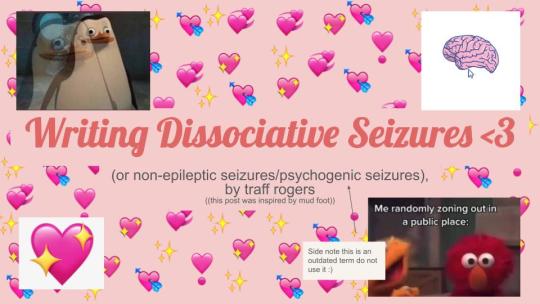
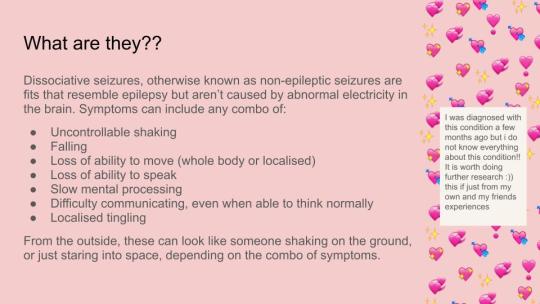
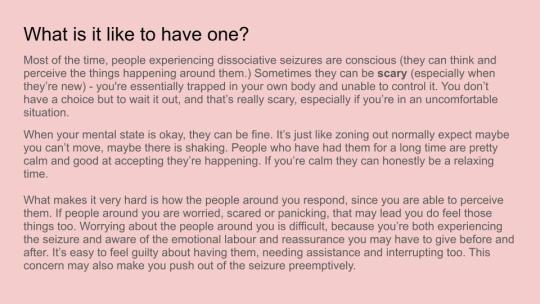
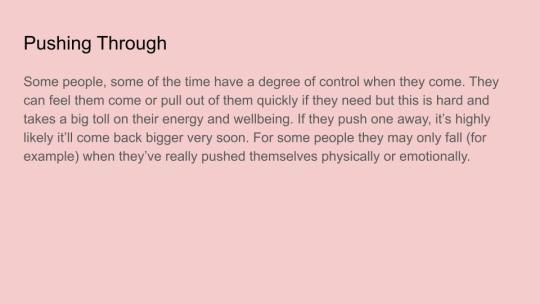
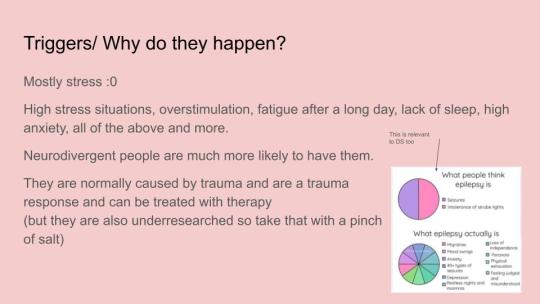
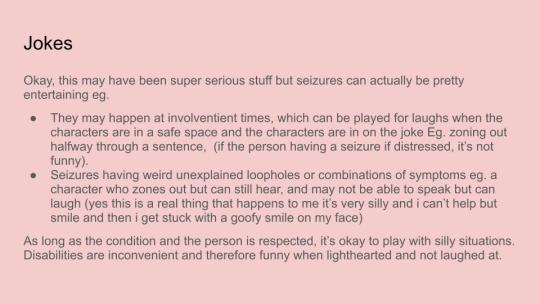
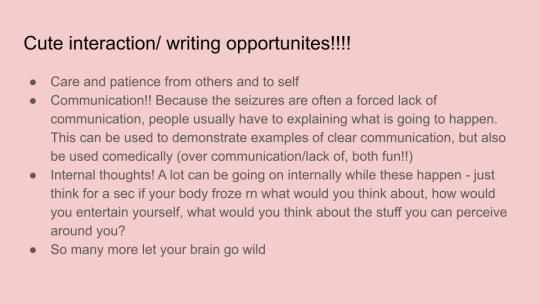

hope this helps
inspired by this post on writing amputees
and this post by @sunnycycle and @snazzzyazzzy
#reference#dissociative seizures#non epileptic seizures#psychogenic non epileptic seizures#writing characters
44 notes
·
View notes
Text
Dissociative Seizures
Educational post. Trigger warnings: Medical equipment and description of seizure.
Written by Tom and Blade.
Why will we cover this?
Although dissociative seizures are not exclusive for those with dissociative disorders. Some people with dissociative disorders will have seizures.
A dissociative seizure is named differently in different parts of the world.
I will be referring to them as dissociative seizures or Non-epileptic attack disorder (NEAD).
However, may also be seen as a one of the many symptoms/types of Functional neurological disorders (FND) its matching term in the ICD-11 is Dissociative neurological symptom disorder. And this post will focus specifically on only the non epileptic seizures.
It is also known as Psychogenic non-epileptic seizures (PNES), Non-epileptic seizures, and Psychogenic seizures.
If you have known these as "pseudo seizures", it is asked that this is no longer a term that should be used because the name suggests that the seizures are not real or faked by the individual having them or cannot have an ever lasting impact.
What causes a dissociative seizure?
Unlike epileptic seizures they are not caused by abnormal electrical activity in the brain.
A person can get triggered by sensations, thoughts, emotions and difficult situations. Memories of painful events can suddenly come into thoughts or awareness or a build up of stress can happen in a moment. The dissociative seizure can happen as a way to cut off stress or bad memories so that they are not relieved. This can cause a person to start to dissociate. This is when they will feel disconnected from the world around them or make it seem like the world is not real. The brain will "shut down" to protect itself from overwhelming stress. The seizure then happens because the emotional reaction of the person becomes physical. It is known that extreme emotional distress can cause illnesses and disorders such as non epileptic seizures.
Some people who have dissociative seizures have them caused by traumatic events. For some they may happen after the event or for others they could start years later. They may start to happen suddenly with no apparent reason at the moment. However, in some people they can be caused by the build up of stress overtime.
When seizures start they can be triggered by stressful or frightening events, even the worry of having a seizure can trigger one. They could also occur spontaneously in non stressful events. Patients may not be able to understand why seizures happen as for some it is hard to recognise the level of stress they are feeling.
What do dissociative seizures look like?
Dissociative seizures can look different from person to person.
You could have episodes of uncontrolled movements, sensations or behaviour. Some dissociative seizures may look more like epileptic seizures or may look more like fainting. Someone may have palpitations, sweat, hyperventilate and have a dry mouth. Someone may fall on the ground or have jerking and shaking movements either on one side or the whole body. A person may lose control of their bladder or bowels and may also bite their tongue. Some people may go unresponsive to people around them and may stare and go blank.
Having seizures caused by a delayed response to a traumatic event may be a part of Post Traumatic Stress Disorder (PTSD). In these seizures a person may have flashbacks, scream or cry and they may not remember the seizure afterwards.
Diagnosis of dissociative seizures.
A specialist will have many ways to tell whether the seizures are epileptic or not. The doctor may be able to tell from detailed descriptions of the seizures or a video of one happening. However, a doctor may ask someone to have an electroencephalogram (EEG) to determine whether electrical changes occur within the person's brain during a seizure. It may also be suggested for a person to have a video-telemetry. This could be done as an inpatient in a hospital or at home. A person will wear EEG equipment for a few days and is linked to a camera. This means that during a seizure the EEG and a video of it happening can be taken at the same time.
Brain scans such as Magnetic resonance imaging (MRI) or Computed Tomography Scan (CT) scans may also be done to rule out any neurological cause for these seizures.
Treatment for dissociative seizures.
Patients may also be asked to see a psychiatrist or psychologist. They can offer Treatment such as psychotherapy, stress-reduction (such as relaxation and biofeedback training), and personal support to help you cope with their seizures.
Talking therapy is useful to understand if there are triggers for the seizures and ways to manage these triggers in daily life. Cognitive behavioural therapy (CBT) is often recommended.
Medication will not help treat non epileptic seizures so they will only be suggested if the patient also has epileptic seizures. Taking medication for non epileptic seizures can cause side effects and do not benefit the person.
It is recommended to keep a normal daily routine. And to make sure that their family and friends are aware and understand. This will mean they will likely be able to help the person in a seizure and prevent harm.
First aid for dissociative seizures (Outsider's perspective):
DO:
- Make sure the person is safe. This can include moving objects away from them. If the person is lying on the floor, put a cushion/something soft under their head.
- Speak Calmly and in a reassuring way to the person
- Non epileptic seizures do not cause damage to the brain no matter how long it happens BUT if you are not sure if it is a dissociative seizure and lasts more than 5 minutes an ambulance must be called. If it is epileptic then a seizure longer than 5 minutes can damage the brain. (Again important to note this is advice given by the NHS of the UK)
- Stay with the person until they have recovered
DO NOT:
- Do not restrain the person. This can cause injury and make the seizure worse.
- Do not put anything in the person's mouth
- Do not attempt to give medication
Self-help tips:
- Write down how you are feeling
- Continue to live normally and not become over cautious. This can help to speed up recovery. It is important to talk to your employer about these seizures and make clear your colleagues know what to do as well.
- Eat and Sleep well
- Build up self confidence
- Green exercise is a great way to boost your mood by being outside even if it is for a short while. Going for a walk outside.
- Fitness programmes can be found online and most can be done from your home
- Remaining positive
The sources we have used for this information also have more information on disability rights and benefits for those with dissociative seizures. And on driving regulations. However, these are only applicable to the UK.
Resources we have used to create this article:
Epilepsy Society: https://epilepsysociety.org.uk/about-epilepsy/what-epilepsy/non-epileptic-seizures
Epilepsy Action: https://www.epilepsy.org.uk/info/seizures/dissociative-seizures-non-epileptic-attack-disorder-nead
Sheffield Teaching Hospital document: https://www.sth.nhs.uk/clientfiles/File/pd3922_NonEpilepticSeizures.pdf
Non-Epileptic Attacks: https://sites.google.com/sheffield.ac.uk/non-epileptic-attacks/home.
Further information:
People's experiences:
Documentary film https://www.youtube.com/watch?v=MA1EYAg9y5k. Photosensitive Epilepsy Trigger Warning at (9:14 - 9:30 ) and at (45:25 - 46:18)
Websites for more information:
NeuroKid: https://www.neurokid.co.uk/ - This is a website for children and young people with dissociative seizures but also has information for parents of these children. The website is also available in French at https://www.neurokid.co.uk/fr/.
Non-Epileptic Attacks: https://sites.google.com/sheffield.ac.uk/non-epileptic-attacks/home. A page written by professionals. They have more resources and go into more detail about the self help we have addressed.
FNH Hope UK: https://www.fndhope.org.uk/about-fnd-hope/fnd-hope-uk/. Has fundraising challenges across the UK. They also have online classes such as dance, painting, mindful meditation and yoga.
Charities:
FND Action: https://www.fndhope.org.uk/about-fnd-hope/fnd-hope-uk/. They can provide ID cards for those in the UK struggling with dissociative seizures.
Brain Charity: https://www.thebraincharity.org.uk/condition/non-epileptic-attack-disorder/. Provides Emotional support and social support for those in the UK and has a helpline.
Trigger warnings: Medical equipment and description of seizure. Educational post.
#dissociative identity disorder#dissociative system#dissociation#actually dissociative#non epileptic seizures#functional neurological disorder#dissociative disorder#disability#psychogenic non epileptic seizures#did system#actually did#endos dni#complex dissociative disorder#ossdid#other specified dissociative disorder#partial dissociative identity disorder#partial did#did osdd#osdd
23 notes
·
View notes
Text
Anyone have any good resources on PNES? Came up in a conversation with a friend a while back and struggling to know where to even start looking for information.
9 notes
·
View notes
Photo

turns out i probably have psychogenic non-epileptic seizures on top of my epilepsy
like, i'm fine, i think, but also just very tired of this shit
86 notes
·
View notes
Text
I’ve been having at least 2 (sometimes up to 12) seizures per day, every day for the last 25 days. I’ve had this disorder for 5 years and it’s never been this bad. Every doctor I’ve seen throws up their hands when I tell them my seizures are nonepileptic, like if they can’t throw drugs at it it doesn’t matter. Im at a loss. There’s no consistent trigger or presentation, so it’s hard to pin down what’s happening and why. What can I do?
#chronic illness#pnes#spoonie#non epileptic seizures#seizures#personal#conversion disorder#psychogenic non epileptic seizures#psychogenic seizures#nead#fnd#functional neurological disorder
18 notes
·
View notes
Text
the way my body is saying fuck you right now lol
#cripple punk#migraines#psychogenic non epileptic seizures#disabled#it feels like there are a bunch of little people knocking on the side of my skull with hammers from inside my brain
7 notes
·
View notes